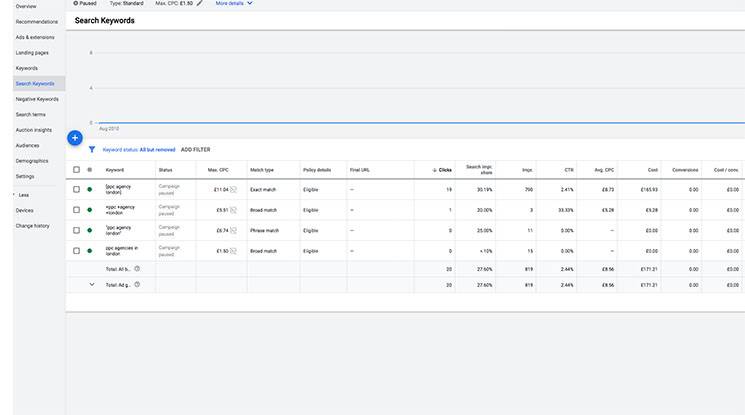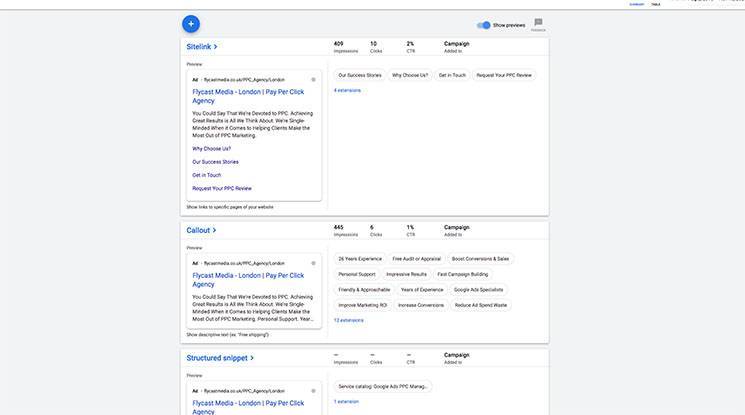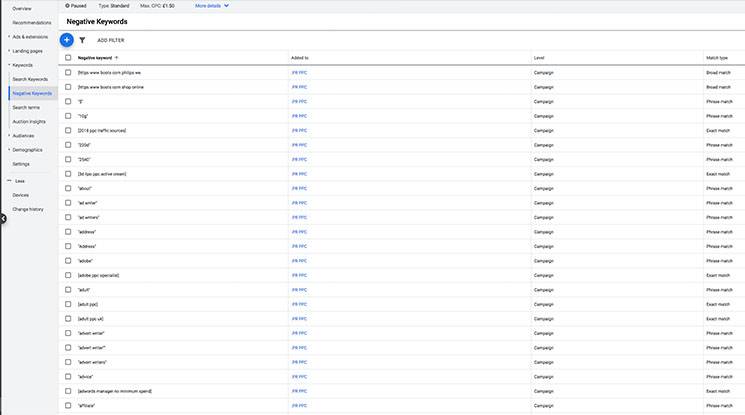STOP WASTING MONEY AND LOSING ROI WITH GOOGLE ADS – WITH OUR SIMPLE GUIDE TO AUDITING YOUR PPC
Measuring The Success Of PPC Advertising
If you have never investigated the efficiency of your PPC campaign, you are missing out on an important opportunity to check its efficiency and, more importantly, correct any niggling overspend. Conducting a PPC campaign audit is by far the best way to find areas for improvement, tweak campaigns and gain sought-after ROI.
Measuring the success of PPC marketing can be complicated but a comprehensive PPC audit will have significant impact on your marketing budget, and of course, your bottom line.
You already check performance across your organisation, so including a large or small business PPC audit will improve your understanding of exactly where your marketing money is going. Don’t miss the opportunity to improve your campaigns by checking out our simple PPC audit guide below.

PPC Audit Checklist – Conversion tracking
Let’s not beat around the bush here, conversions are your end goal when it comes to advertising on Google or any other PPC service. With this in mind, one of the biggest (and unfortunately easiest) mistakes you can make is to neglect PPC conversion tracking. If you don’t track your conversions, you won’t be able to precisely pin a sale onto a campaign, and without that pin you won’t be able to repeat the success.
In order to gain a clear picture of success, your conversion tracking set-up needs to be correctly implemented. If you have too many, too few, or no conversions registered, your tracking could be out of alignment.
Common issues here might include:
- Failure to track conversions made by phone call
- The measuring of page visits rather than order confirmations
- Conversion codes being linked to the wrong pages (typically landing pages)
PPC Audit Checklist – Conversion Tracking
Prioritise the correct generation and implementation of conversion tracking code
Keyword Ad Groups
Your ad group is a set of Google Ads, which have been set up to target a mutual keyword set. As a rule, ad groups that contain more than 15-20 keywords lead to a less effective, generic approach.
One option, if this is the case, might be to split your keywords into different ad groups.
If you have a particularly focused requirement, consider experimenting with single user keyword groups where the same keyword is used but with different emphases (for example, exact match and broad match). When populating your ad groups, consider the following points:
- Keywords need to fit seamlessly into copy so semantics are important
- Think about using granularity or detail around a tight theme
- Recognise the value of being specific
PPC Audit - Action Point
Seek out ad groups containing more than 20 keywords and clean these up.

Negative Keywords
When you add a keyword to your negative keyword list Google will remove your ad from the list shown to anyone who uses that phrase. Perhaps the easiest example of a negative keyword is the word ‘free’, if you are offering a paid service, you want to avoid paying for clicks from those seeking free offers.
Other potential negative keywords include, ‘online’ for those selling physical products, and ‘recipe’ for those selling food products. Wasted ad spend can account for considerably inflated cost per conversion so it is worth trying to eliminate it through the judicious use of negative keywords.
- Study your search terms report to identify negative keywords
- Consider implementing click-fraud detection software and click tracking
- Invest in an automated negative keyword discovery tool
PPC Audit - Action Point (Negative Keywords)
Create a master list of negative keywords that you want to avoid for all campaigns.
Target Goals
Setting target goals should be a main feature of your PPC strategy but it is all too easy to slip away from these goals when it comes to setting up and monitoring your Google Ads campaign.
For example, if a website visit is your desired ad outcome, make sure that you have selected ‘Website traffic’ as your goal, if you are more focused on promoting your brand, set the goal to ‘Brand awareness & reach’.
These options, along with your campaign type will govern how and where your ads appear. Target goals points to consider:
- Your campaign goal choice will affect the features available to you
- Video campaigns are only allowed a single goal
- Your PCC audit should take into account your campaign goals
PPC Audit – Action Point (Target Goals)
Put aside some time to set up and regularly monitor PPC target goals.

Ad Extension
Ad extensions improve the visibility and hopefully the ROI of your ads by including additional inserts of information. These could include phone number, review statistics and additional product information, all of which could may well lead to higher click through rates.
Prospective clients are drawn to information and the more relevant information provided in your ad extensions, the more likely your ad is to be selected. Checking on the performance of your ad extensions however, is important to make sure you aren’t paying for unfulfilling clicks such as those to unanswered phone calls or irrelevant pages.
- Schedule extensions to fit company availability
- Remove erroneous physical location extensions
- Match your ad extensions to your CTA
- Think carefully about Google automated extensions
PPC Audit – Action Point (Ad Extensions)
Look for opportunities to improve on your current ad extension usage.
Landing Pages
Landing pages can have a huge impact on both the quality score and the success of a Google Ads campaign. Quality scores are important because they affect both the rank and the cost per click of your advert.
Key factors that help form your quality score include landing page time and landing page quality. This means that it is imperative for each campaign to have its own exclusive landing page. Landing page considerations include:.
- Making landing pages specific to search goals (for example, men’s jackets)
- Considering search expectations and building landing pages to these
- Ensuring message match to searches with careful page titles
PPC Audit – Action Point (Landing Pages)
Conduct a landing page audit with an eye towards page quality, loading time, suitability and CTA.
A PPC audit report is a great starting point for improving performance targets but there can be no beating a thorough and professional complete PPC audit.
At Flycast Media we provide specific PPC audit services that are tailored to your goals and give proven results. With decades of experience behind us, and a flair for state-of-the-art techniques, we can put your PPC campaign ahead of the crowd.
Contact our PPC agency in London to get the marketing results your financial organisation really needs.
And don't forget about landing pages.
Shane McEvoy is a financial marketing expert with over 30 years' experience in digital advertising and financial services. He founded Flycast Media, a leading financial marketing agency, and has authored several influential guides and regularly contributes to respected industry publications - read his profile.